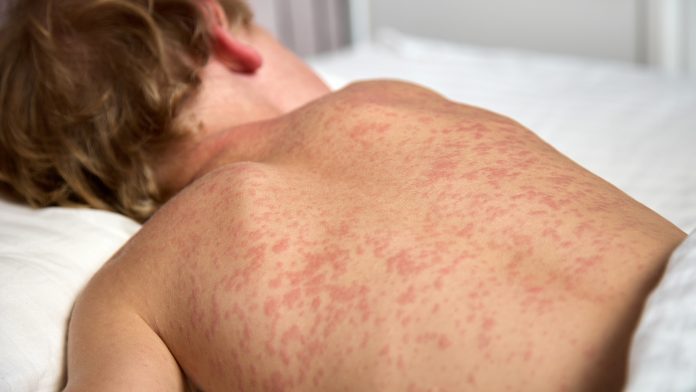
Researchers from the University of Cambridge have emphasised that children born by caesarean section must receive two doses of the measles vaccine for robust protection.
The University of Cambridge, UK, and Fudan University, China, has found that a single dose of the measles vaccine is up to 2.6 times more likely to be completely ineffective in children born by c-section, compared to those born vaginally.
Measles is an infection that spreads very easily, causing symptoms such as a rash and white spots in the mouth. To combat this disease, the MMR vaccine is offered to all children in the UK, which protects against measles, mumps, and rubella.
The results of the study are published in the journal Nature Microbiology.
Why the measles vaccine is more likely to fail?
Vaccine failure means the child’s immune system does not produce antibodies to fight against measles infection, so they remain susceptible to the disease.
A potential reason for failure is linked to the development of the infant’s gut microbiome – the vast collection of microbes that naturally live inside the gut. Other studies have shown that vaginal birth transfers a greater variety of microbes from mother to baby, which can boost the immune system.
“We’ve discovered that the way we’re born – either by C-section or natural birth – has long-term consequences on our immunity to diseases as we grow up,” said Professor Henrik Salje in the University of Cambridge’s Department of Genetics, joint senior author of the report.
He added: “We know that a lot of children don’t end up having their second measles jab, which is dangerous for them as individuals and for the wider population.
“Infants born by C-section are the ones we really want to be following up to make sure they get their second measles jab because their first jab is much more likely to fail.”
“With a C-section birth, children aren’t exposed to the mother’s microbiome in the same way as with a vaginal birth. We think this means they take longer to catch up in developing their gut microbiome, and with it, the ability of the immune system to be primed by vaccines against diseases including measles,” said Salje.
Two jabs are required for protection against measles
The researchers used data from previous studies of over 1,500 children in Hunan, China, which included blood samples taken every few weeks from birth to age 12. This allowed the researchers to monitor the levels of measles antibodies in the blood and how it changes over the first few years of life.
They found that 12% of children born via C-section had no immune response to their first measles vaccine, versus 5% of children born by vaginal delivery. The research does highlight that many C-section children’s immune systems responded to their first vaccination.
Two doses of the measles vaccine are needed for the body to develop long-lasting immunity and protection against measles. However, data from the World Health Organization found that in 2022, only 83% of the world’s children had received one dose of measles vaccine by their first birthday – the lowest since 2008.
Salje said: “Vaccine hesitancy is really problematic, and measles is top of the list of diseases we’re worried about because it’s so infectious.”








